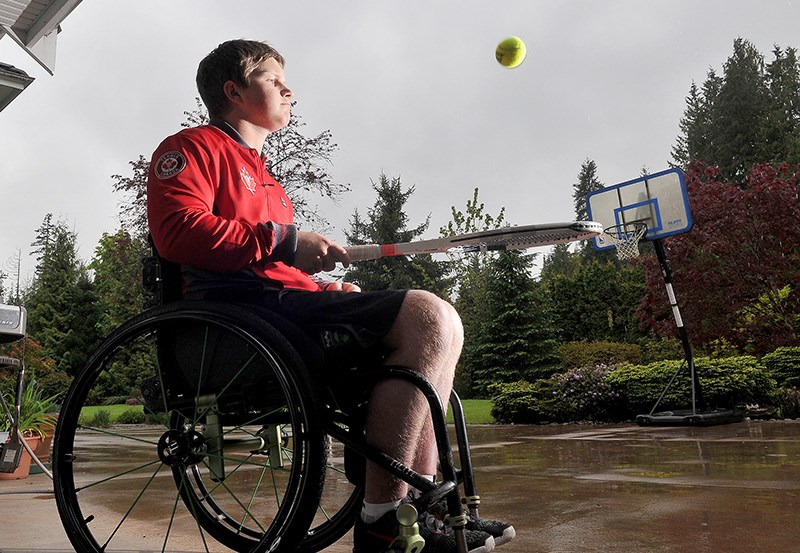Thomas Venos is turning the worst moment of his life into the biggest opportunity of his athletic career.
The 17-year-old Grade 12 student at Heritage Woods secondary school has his sights set firmly on competing for Canada in wheelchair tennis at the 2020 Paralympic Games in Tokyo. Two years ago Venos didn’t even play tennis. He also didn’t need a wheelchair.
But everything changed when Venos crashed while riding his dirt bike at the family cabin in the Cariboo. He suffered a T12 spinal cord injury and was paralyzed from the hips down. He’d never play his most beloved sport, soccer, again.
Venos didn’t despair.
Within a month he was in the gym at G.F. Strong rehabilitation hospital shooting hoops and learning how to dribble the basketball while maneuvering his chair.
“It was pretty fun,” said Venos.
When a representative from BC Wheelchair Sports visited the facility to promote an upcoming tennis tournament, he invited Venos to play even though he’d never swung a racket in anger before.
On May 6, Venos reached the semi-finals of a major international competition in Alghero, Italy against some of the top players from countries like the United States, Chile, Netherlands, Brazil, Great Britain and Turkey. Suddenly Tokyo doesn’t seem so distant.
Venos said he’s always been athletically-inclined; in addition to playing goal in soccer, he also played baseball and even a year of varsity volleyball. So when he lost the use of his legs, he saw no reason for that to change.
In fact he couldn’t let it change, he said, because sports were his link to his former, active life.
Venos’ first tournament didn’t go so well. He was still mastering pushing his chair and adding a racket to the mix made it more complicated.
“I was pretty much just sitting there,” said Venos, who’d practised only twice before his first competition. “People just hit the ball past me.”
But with encouragement from his family and coaches who recognized his potential, Venos stuck with it. He started working with the national wheelchair tennis team coach at the Burnaby Tennis Club and at the University of British Columbia. He was connected with a coach at the Performance Institute in Burnaby to help him with the mechanics of pushing his wheelchair.
“I was definitely getting better,” said Venos, who started winning games, but not yet matches.
His breakthrough came at a major tournament in Jan., 2016, at Indian Wells, California; Venos won his division without losing a single game. He kept on winning, and moving up the ranks to play tougher, more experienced competitors.
Venos’ success at the World Team Cup tournament in Italy, the second-top competition after the Paralympics, has whet his appetite for more.
“I’ll have to put in lots of training,” said Venos, who’s been accepted into the tennis program at the University of Alabama but is waiting to hear if a scholarship will help ease the financial burden of heading south for school. “I have to keep improving.”
And dreaming.
“I always wanted to be a pro soccer player,” said Venos. “But now I can dream of getting to the Paralympics.”



